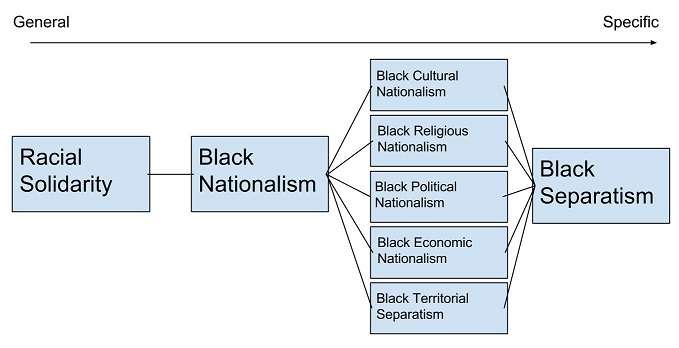Black separatism
Black separatism is a separatist political movement that seeks separate economic and cultural development for those of African descent in societies, particularly in the United States. Black separatism is a subcategory of black nationalism, stemming from the idea of racial solidarity, and it also implies that black people should organize themselves on the basis of their common experience of oppression as a result of their race, culture, and African heritage.[1] Black separatism in its purest form, as a subcategory of black nationalism, asserts that black people and white people should ideally form two independent nations.[2] Additionally, black separatists often seek their original cultural homeland. Black separatists generally think that black people are hindered in their advancement in a society that is dominated by a white majority.
| This article is part of a series about |
| Black Power |
|---|
 |
|
History |
|
Ideologies |
|
Organizations
|
|
Related |
|
Black nationalism vs. black separatism
There are similarities between black nationalism and black separatism. They both advocate rights for black people, but there are a few differences between them. All black separatists are black nationalists, but not all black nationalists are black separatists. Black separatists believe that black people should be physically separated from other races, primarily whites; black separatists would want a separate nation for black people. This is slightly different from black nationalists because black nationalists don't always believe in a physical separation of black people. In some form, black nationalists do believe in separation, but not physical separation. Black nationalists focus more on black pride, justice, and identity. Their belief is that black people should be proud of their own skin, heritage, and beauty. They also believe that there should be justice for black people especially in the United States. Examples of black nationalist organizations include the Nation of Islam and the New Black Panther Party.
Concepts

In his discussion of black nationalism in the late nineteenth and early twentieth centuries, the historian Wilson Jeremiah Moses observes that "black separatism, or self-containment, which in its extreme form advocated the perpetual physical separation of the races, usually referred only to a simple institutional separatism, or the desire to see black people making independent efforts to sustain themselves in a proven hostile environment."[3]
Scholars Talmadge Anderson and James Stewart further make a distinction between the "classical version of Black separatism advocated by Booker T. Washington" and "modern separatist ideology." They observe that "Washington's accommodationist advice" at the end of the nineteenth century "was for Blacks not to agitate for social, intellectual, and professional equality with Whites." By contrast, they observe, "contemporary separatists exhort Blacks not only to equal Whites but to surpass them as a tribute to and redemption of their African heritage."[4] Anderson and Stewart add, moreover, that in general "modern black separatism is difficult to define because of its similarity to black nationalism."[4]
Indeed, black separatism's specific goals were historically in flux and they also varied from group to group. Martin Delany in the 19th century and Marcus Garvey in the 1920s outspokenly called for African Americans to return to Africa, by moving to Liberia. Benjamin "Pap" Singleton looked to form separatist colonies in the American West. The Nation of Islam calls for several independent black states on American soil. More mainstream views within black separatism hold that black people would be better served by schools and businesses that are exclusively for black people, as well as by local black politicians and police.[5]
See also
Notes
- Hall 1978, p. 1.
- Hall 1978, p. 3.
- Moses 1988, p. 23
- Anderson & Stewart 2007, p. 203
- M.R. Delany; Robert Campbell (1971) [1969]. Search for a place: Black separatism and Africa, 1860. Ann Arbor: University of Michigan Press. ISBN 0-472-06179-8. OCLC 2907368.
References
- Anderson, Talmadge; Stewart, James B. (2007), Introduction to African American studies: Transdisciplinary Approaches and Implications, Baltimore: Inprint, ISBN 978-1-58073-039-6.
- Hall, Raymond L. (1978), Black Separatism in the United States, University Press of New EnglandCS1 maint: ref=harv (link).
- Malcolm X (1964), The Ballot or the Bullet, April 4, 1964.
- Moses, Wilson Jeremiah (1988), The Golden Age of Black Nationalism, 1850-1925, Oxford: Oxford University Press, ISBN 978-0-19-520639-5CS1 maint: ref=harv (link).
Further reading
- Jenkins, B. L., & Phillis, S. (1976). Black separatism: a bibliography. Westport, Conn: Greenwood Press.
- Hall, R. L. (1977). Black separatism and social reality: rhetoric and reason. New York: Pergamon Press.
- Hall, R. L. (1978). Black separatism in the United States. Hanover, N.H.: Published for Dartmouth College by the University Press of New England.
- Bell, H. H., Holly, J. T., & Harris, J. D. (1970). Black separatism and the Caribbean, 1860. Ann Arbor: University of Michigan Press.
- Browne, R. S., & Vernon, R. (1968). On black separatism. New York: Pathfinder Press.
External articles
- Franklin Foer, Racial Integration Slate Magazine.
- Malcolm X - The Ballot or the Bullet-April 4, 1964
- Malcolm X - By Any Means Necessary